“It only takes ten seconds to crush a man’s
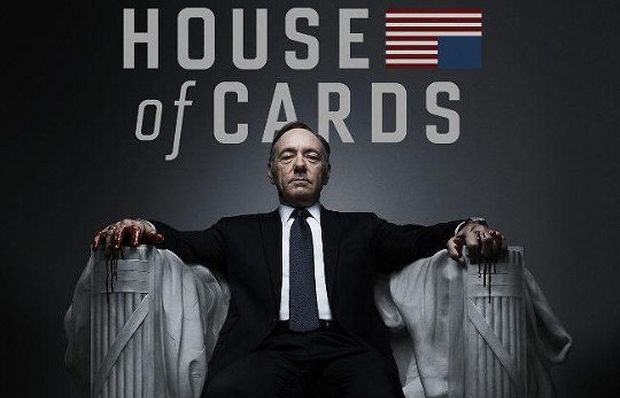 House of Cards is a series about ambition in the world of politics.
House of Cards is a series about ambition in the world of politics.
Characters and the actors that play them are often mixed up. In fact, they often feed on each other. “It only takes ten seconds to crush a man's ambitions”, says Frank Underwood before becoming President in the series House of Cards.
It took Kevin Spacey little longer to lose his reputation as an actor and to put an end to the series, once word got out about his behaviour as a “sexual predator”, due to the harassment and abuse of male members of his team.
Over the decade that the winner of two Oscars, for “Usual suspects” (1995) and “American Beauty” (1999), was Director of the Old Vic theatre in London, he is accused of having abused of twenty people.
This was well before David Fincher thought of him for the House of Cards series. In this he plays the part of a cynical politician, who lies, manipulates and is capable of killing with his own hands. In that time, he is accused of eight other incidents, that have now been brought to light.
All these scandals led the actor to open up about his homosexuality, having not yet “come out of the closet” at the end of October 2017. Interestingly, Spacey’s character in the series also shows signs of bisexuality, or at least of bi-curiosity, in the strange triangle that develops between him, his wife and a bodyguard.
“We've been lying for a long time, Francis”, his wife, played by Robin Wright, warns. “Of course we have”, Underwood replies: “Imagine what voters would think if we started telling them the truth”.
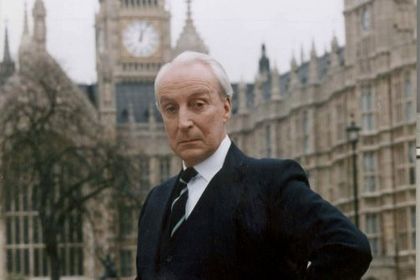 House of Cards is based on a series of the British BBC in the nineties.
House of Cards is based on a series of the British BBC in the nineties.This series by Beau Willimon is a North-American version of a British production of the 1990s, also called “House of Cards”, based on the novel by Michael Dobbs, who was the former Chief of Staff of the British Conservative Party at the time that Margaret Thatcher was in power. From here are taken those direct glances at the camera, first used by the English actor Ian Richardson, now dead. The daring of the character played in the US series by Kevin Spacey can only be compared with the boldness of an actor capable of overstepping the mark with the ex-husband of the princess Märtha Louise of Norway.
NO SIGN OF GOD
The gods served by the characters in House of Cards are sex and power, but as the Machiavellian politician says – quoting the “great man” Oscar Wilde –, “Everything in the world is about sex except sex. Sex is about power”. It is, of course, sex without love, given that, in Underwood’s opinion, lust widens your perspective, while love narrows it to the point of blindness.
The first season ends with a prayer. After coming up with another of his twisted schemes of revenge, he goes into a church, gets down on his knees and says: “Every time I’ve spoken to you, you have never spoken back. Although, given our mutual disdain, I can’t blame you for the silent treatment. Perhaps I’m speaking to the wrong audience”. He then looks down at the floor and asks: “Can you hear me? Are you even capable of language or can you only understand depravity?”.
In the end, Spacey’s character looks at the camera and concludes: “There is no solace above or below. Only us. Small, solitary, striving, battling one another. I pray to myself for myself.” On his way out of the church, he lights a candle, choosing one of many, but then, all of a sudden, he blows them all out.
There is no sign of God anywhere in House of Cards. The beginning could not be more brutal. Underwood, a heartless plumber of Washington’s political sewers, tells the viewer: “There are two kinds of pain. The sort of pain that makes you strong, or useless pain. The sort of pain that's only suffering. I have no patience for useless things”. With this, and without blinking an eye, he twists the neck of a dog that he has just run over, killing it.
THE CORRUPTION OF POLITICS
As Chad Comello puts it, “Underwood […] doesn’t just inhabit the darkness; he creates it”. While a lot can be learnt about a culture from its heroes, we can learn even more from its villains, who are the protagonists of this series. Spacey’s character is unapologetically power hungry. When his former colleague and the current representative of a lobby group, Remy Denton, falls from grace, Underwood says:
“He chose money over power. In this town, a mistake nearly everyone makes. Money is the Mc-mansion in Sarasota that starts falling apart after ten years. Power is the old stone building that stands for centuries. I cannot respect someone who doesn't see the difference”.
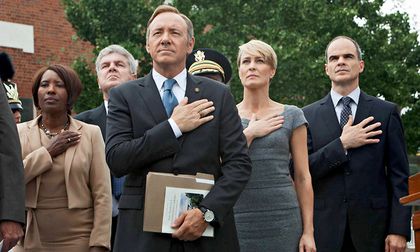 Patriotism or an ideology are only a justification to reach power.
Patriotism or an ideology are only a justification to reach power.Many people define politics by its corruption, as if the only thing that interested corrupt people were money. Underwood shows us that an idol that is more attractive than money is the power that it can achieve. Not seeing the difference is a superficial diagnosis of corruption that does not acknowledge human motivation.
ALL EQUAL?
In its original version, the British series portrays a conservative politician, from the same party as the book’s author. In the North-American series the main character is from the Democratic Party, like the President in The West Wing – although House of Cards is closer to the darkness of Boss –. As in real life, their political affiliation is neither here nor there. They are all equally ambitious and manipulating. What we are seeing are the sewers of power: what lies behind the clean and manicured image put on by our leaders.
What’s more, as in real politics, one’s greatest enemies are in one’s own party. It is all betrayal and vengeance. Their ambition is so corrosive that all they do is set traps and trip anyone up who tries to raise their head above their own. And the most interesting thing is the person with the most power isn’t the president, but rather those who surround him, pulling the strings in the wings. That is why the aspirations of a congressman like Underwood aren’t to be President, but rather a secretary of state, or at the most, Vice President.
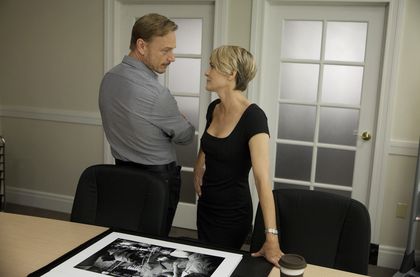 Behind the cold shield of the character of Robin Wright one can find a fragile person.
Behind the cold shield of the character of Robin Wright one can find a fragile person.The despicable character played by Spacey becomes repulsive. His wife, played by Robin Wright, seems more attractive. Her cold exterior hides a breakable and frustrated person who, irony of ironies, is the chairperson of a humanitarian organisation working in the third world. They are clearly a couple united by their ambition, in which the one doesn’t question the other’s thinking, but just tries to help them. Their conversations next to the window, through the cigarette smoke and a glass of wine in hand, shows us that marital love is sometimes no more than the love of oneself. There’s an existential emptiness that not even marriage can fill.
WEB OF LIES
From the opening credits, series like this produce a hypnotic effect. We see images of Washington DC, as if in a vortex, giddily going from day to night, from light to dark, turning the stars and stripes upside down. There is no place for patriotism or ideology. Everything is seen as a springboard to try to satisfy the ambition of reaching the top. Getting rid of obstacles is nothing but collateral damage.
It is a bleak story that does away with any kind of idealism, like “The Ides of March” – whose author, Beau Willimon, is one of the series’ producers, together with the director of the British version, Andrew Davies–. Directors of the episodes include well-known names like Joel Schumacher, or James Foley (Glengarry Glen Ross). But the ultimate director is Fincher, who uses his signature on-screen text messages, as seen in “The Social Network”.
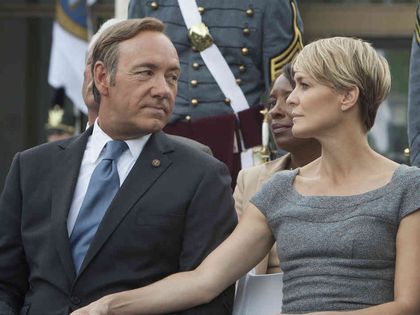 The Underwood are a couple united by ambition.
The Underwood are a couple united by ambition.There is something very disturbing in the atmosphere created by the series, suggesting hidden agendas behind every sentence, gesture and look. Although it is now trending to talk of the Shakespearean dimension of this series, the characters have something of “I, Claudius”. The Underwoods could be Shylock and Lady Macbeth, or Augustus and Livia. As in a game of chess, their advantage in this jungle is that they anticipate the other players’ moves. Although they have a lieutenant and implacable executioner in the person of Doug Stamper (Michael Kelly), any threat can bring this fragile structure built upon lies tumbling down.
A HOUSE DIVIDED
The charade played out in House of Cards seems to confirm our deepest fears. We ask ourselves along with Jeremiah: “Why does the way of the wicked prosper? Why do all the faithless live at ease?” (12:1); these people “in whose hands are wicked schemes, whose right hands are full of bribes.” (Psalm 26:10).
Like Asaph in Psalm 73, we may be jealous of the arrogant, because they prosper in their impiety (v. 3). They seem to have no shame (v. 3). They do not seem to have any anxiety. They are healthy and work (4–5), to achieve the iniquity of “their callous hearts” (7). The problem is that their strength leaves them through their mouths (8-9) and one day they will be swept away (18-19).
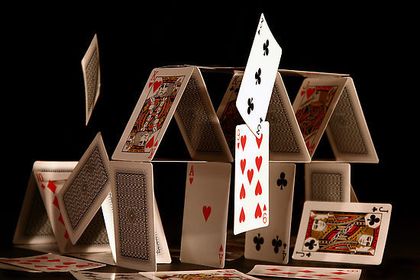 House of Cards is a fragile structure, built on lies.
House of Cards is a fragile structure, built on lies.The lie of the spider’s web surrounding us, is to think that evil is so clever that it never makes mistakes. The truth is that evil also implies folly. And although Underwood despises those who prefer money to power, he does not realise that a house divided against itself cannot stand.
A house that is not built on the rock is not firm, because what is built on sand is swept away by the storm and crumbles (Matthew 7:24–27).
THE CITY OF MAN
Time and again, however, we fall into the same trap as Underwood, thinking that if we hold the power to dominate and control others, we will be strong. As Augustine argues, it is a fallacy to believe that if we do evil, thinking that good will come of it, everything will turn out well.
Shows like House of Cards destroy any hope we may have in the City of Man of which Augustine spoke. The injustice that it harbours makes us ask, together with Abraham, for one righteous man to free the city from destruction (Genesis 18).
The evil in human society shows us the need for a perfect man, through whom God can save and redeem the world of the fallen men. Only He can save us from our present moral and spiritual crisis. The problem is that the Kingdom of that Man, Jesus Christ, is not of this world. That is why we pray: “Let your kingdom come!”.

Las opiniones vertidas por nuestros colaboradores se realizan a nivel personal, pudiendo coincidir o no con la postura de la dirección de Protestante Digital.
Si quieres comentar o